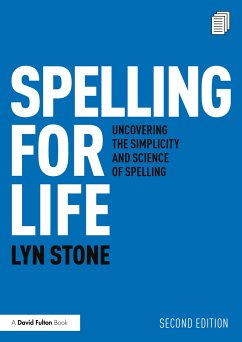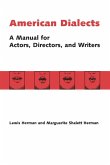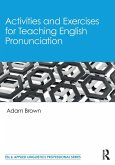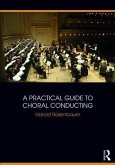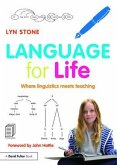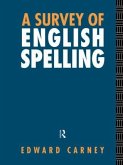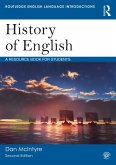There is a myth that English spelling is unnecessarily complex, and it is spread by those who don't understand the writing system. Spelling for Life offers lucid, accessible tools which help to reveal that, when explicitly and systematically taught, spelling is scientific, law-abiding and even elegant.
Using a synthesis of theory, research and teaching experience, the fascinating nature of English spelling is systematically teased out. The examples and exercises throughout offer an encouraging, accessible way to implement the program of study and strive to reveal the beauty of spelling. Spelling for Life enables teachers and students to:
- learn what the common spelling coping strategies are;
- gain insights into undoing poor spelling habits;
- work together to reveal patterns not only in regular spelling, but also in words which on the surface seem to break the spelling rules;
- practise successful spelling strategies, progressing from simple to complex words rapidly and with confidence.
This new and improved edition includes updated spelling techniques as well as new chapters on orthographic mapping, spelling assessment, teaching consonant clusters well and suffixing rules. Aided by example lessons, formative assessments, unique tools, a scope and sequence, and extensive practice lists, this highly acclaimed overview of spelling succeeds in developing theory and practice in the writing system for teacher and student alike.
Using a synthesis of theory, research and teaching experience, the fascinating nature of English spelling is systematically teased out. The examples and exercises throughout offer an encouraging, accessible way to implement the program of study and strive to reveal the beauty of spelling. Spelling for Life enables teachers and students to:
- learn what the common spelling coping strategies are;
- gain insights into undoing poor spelling habits;
- work together to reveal patterns not only in regular spelling, but also in words which on the surface seem to break the spelling rules;
- practise successful spelling strategies, progressing from simple to complex words rapidly and with confidence.
This new and improved edition includes updated spelling techniques as well as new chapters on orthographic mapping, spelling assessment, teaching consonant clusters well and suffixing rules. Aided by example lessons, formative assessments, unique tools, a scope and sequence, and extensive practice lists, this highly acclaimed overview of spelling succeeds in developing theory and practice in the writing system for teacher and student alike.
'In the digital age, when spellchecking is almost universal, it is easy to forget the essential role of learning to spell in becoming literate. In this update to her book, Lyn Stone reminds us that learning to spell is more than just the tedious task of memorizing lists of words. Learning to spell is the partner of learning to read, each enhancing and dependent on the other. Lyn not only reminds us of the importance of spelling, but shows us how to teach it in a way that fits with learning to read and matches what we know about how young brains become literate.'
Steven P. Dykstra PhD, Psychologist and Member of the International Foundation for Effective Reading Instruction & CORELearn National Advisory Board
'We used to teach spelling more effectively, but since whole language, balanced literacy and multi-cueing reading instruction has dominated classrooms, teaching spelling has been replaced by approaches that rely on visual memory; a very inefficient strategy. You cannot teach what you do not know, so as an academic who works with pre-service and experienced teachers, who can rarely explain why words are spelled the way they are, Spelling for Life will provide the lesson plan, words and knowledge to make explicit how to teach the conventions of the writing system.'
Dr Lorraine Hammond, PhD CF AM, Associate Professor, Edith Cowan University, Australia
'Lyn Stone has done the (almost) impossible! With technical accuracy and scientific precision, she provides an approach that makes spelling your friend. When you look for a friend, don't you want someone reliable and predictable, as well as fun and interesting? Lyn's masterful description of the English writing system shows spelling in that light. Learning how to spell well becomes fascinating and approachable. And Lyn offers instructors a framework that weaves spelling into a larger literacy context. Not only will students have improved spelling, but their ability to read and express themselves is bound to grow too, with careful attention paid to the many layers of our complex language.'
Sara Peden, R. Psych, Member Ontario College of Teachers
Steven P. Dykstra PhD, Psychologist and Member of the International Foundation for Effective Reading Instruction & CORELearn National Advisory Board
'We used to teach spelling more effectively, but since whole language, balanced literacy and multi-cueing reading instruction has dominated classrooms, teaching spelling has been replaced by approaches that rely on visual memory; a very inefficient strategy. You cannot teach what you do not know, so as an academic who works with pre-service and experienced teachers, who can rarely explain why words are spelled the way they are, Spelling for Life will provide the lesson plan, words and knowledge to make explicit how to teach the conventions of the writing system.'
Dr Lorraine Hammond, PhD CF AM, Associate Professor, Edith Cowan University, Australia
'Lyn Stone has done the (almost) impossible! With technical accuracy and scientific precision, she provides an approach that makes spelling your friend. When you look for a friend, don't you want someone reliable and predictable, as well as fun and interesting? Lyn's masterful description of the English writing system shows spelling in that light. Learning how to spell well becomes fascinating and approachable. And Lyn offers instructors a framework that weaves spelling into a larger literacy context. Not only will students have improved spelling, but their ability to read and express themselves is bound to grow too, with careful attention paid to the many layers of our complex language.'
Sara Peden, R. Psych, Member Ontario College of Teachers

